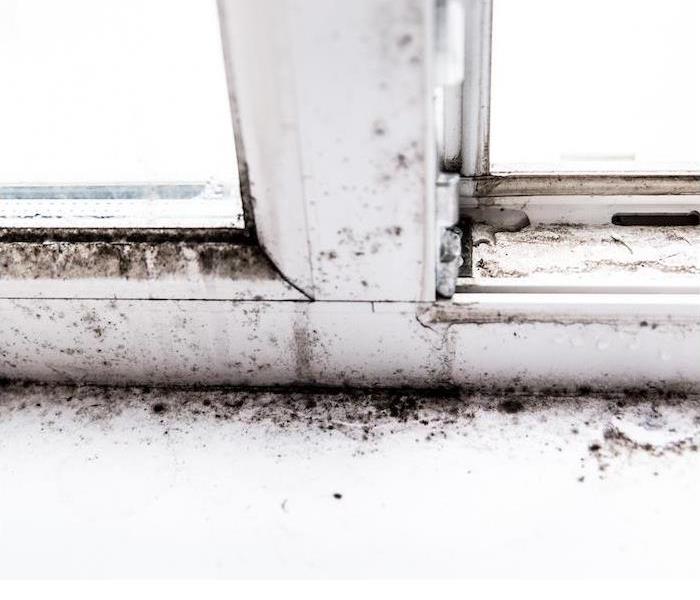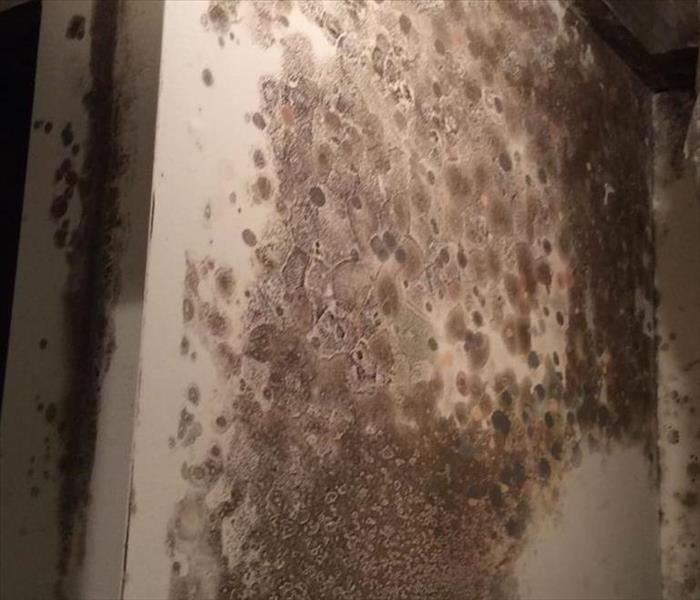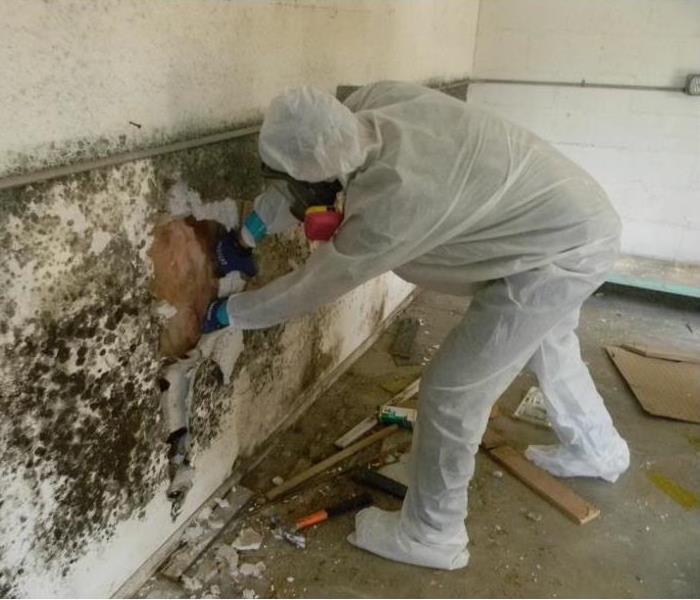Recent Mold Remediation Posts
Cold Weather Mold Prevention: Keeping Your Home Safe This Winter in Conway | SERVPRO of Conway & Faulkner Counties
1/8/2025 (Permalink)
 Prevent Winter Mold: Keep your Conway home mold-free this winter with SERVPRO's cold-weather prevention tips!
Prevent Winter Mold: Keep your Conway home mold-free this winter with SERVPRO's cold-weather prevention tips!
As winter approaches and temperatures drop in the Conway community, homeowners may not only worry about heating bills but also the hidden risks that cold weather can bring. One of the most common issues during colder months is mold growth. The cold, combined with the increased indoor humidity from heating systems, creates the perfect environment for mold to thrive.
SERVPRO of Conway & Faulkner Counties has some key tips to help prevent mold from taking hold in your home this winter, ensuring a healthier and more comfortable living space.
<h2control-indoor-humidity-levels">1. Control Indoor Humidity Levels
During the colder months, your home is often sealed tight to keep the warmth in. While this is great for energy efficiency, it also reduces airflow and can trap excess moisture inside. High humidity is one of the primary causes of mold growth. To prevent this, it’s important to keep your indoor humidity levels under control. A good target is to keep humidity between 30% and 50%.
You can use a hygrometer to measure the humidity in your home, and if levels are high, consider using a dehumidifier in areas like basements, bathrooms, and kitchens. Also, ensure that your bathroom exhaust fans are functioning properly to reduce moisture after showers. If possible, open windows on dry, sunny days to let fresh air circulate throughout your home.
<h2insulate-pipes-and-prevent-condensation">2. Insulate Pipes and Prevent Condensation
When the temperature drops, condensation can form on pipes, windows, and walls, providing a perfect breeding ground for mold. Insulating your pipes, especially those in unheated areas like basements, attics, or crawl spaces, can significantly reduce the risk of condensation. Use pipe insulation sleeves or wrap them with foam or fiberglass to maintain the temperature of the pipes and prevent the water droplets that promote mold growth.
Windows are another potential source of condensation during the cold months. Consider using thermal curtains or installing weather stripping around windows to help keep cold air from causing condensation inside your home. In addition, always wipe down any moisture that collects on windowsills or around pipes to prevent mold growth before it starts.
<h2maintain-your-heating-system-and-ventilation">3. Maintain Your Heating System and Ventilation
Proper maintenance of your heating system is key to preventing mold. Dust and dirt that accumulate in your furnace or ducts can trap moisture, making it a perfect environment for mold to develop. Be sure to clean or replace your furnace filters regularly, and have your system inspected before the cold season sets in. Additionally, good ventilation is crucial in preventing mold buildup. Stale, moist air can linger in poorly ventilated areas like attics and crawl spaces.
Consider having your attic or basement inspected for proper airflow and ventilation. If necessary, add vents or install a small fan to keep air circulating. Keep air vents open in rooms where moisture can build up, and ensure that exhaust fans in areas like the kitchen and bathroom are in good working order.
By taking these simple steps to control humidity, prevent condensation, and ensure proper ventilation, you can help keep mold out of your home this winter. If you do discover mold growth, it’s important to address it immediately to prevent further damage to your property. SERVPRO of Conway & Faulkner Counties is here to help with expert mold remediation services and advice.
What Is Black Mold?
5/29/2018 (Permalink)
You may have seen sensational news reports that warn about the dangers of “black mold” or “toxic mold”. These reports can be alarming and confusing so it’s beneficial to get the facts to better understand mold.
Stachybotrys chartarum is the type of mold often called black mold, and it does produce allergens and irritants. However, many types of mold can produce allergens and irritants. Treat any mold with caution – stay out of affected areas and don’t touch or disturb the mold.
How Do I Tell If It’s Black Mold?
Since many types of mold can cause reactions, you should contact us regardless of the color or type of mold. In many instances, multiple types of mold may exist in the same house or structure. If you suspect you have a mold problem, contact SERVPRO of Conway and Faulkner Counties immediately.
If You See Signs of Mold, Call Us Today – (501) 328-3301
Understanding Mold
When water intrudes into your property, mold growth can start in as little as 48 hours. Consider the following mold facts:
- Mold is present almost everywhere, indoors and outdoors.
- Mold spores are microscopic, float along in the air, and may enter your home through windows, doors, or AC/heating systems or even hitch a ride indoors on your clothing or a pet.
- Mold spores thrive on moisture. Mold spores can quickly grow into colonies when exposed to water. These colonies may produce allergens and irritants.
- Before mold remediation can begin, any sources of water or moisture must be addressed. Otherwise the mold may return.
- Mold often produces a strong, musty odor, and that odor can lead you to possible mold problem areas.
- Even higher-than-normal indoor humidity can support mold growth. Keep indoor humidity below 45 percent.
Does Your Conway or Faulkner County Home Have A Mold Problem?
5/23/2018 (Permalink)
Microscopic mold spores naturally occur almost everywhere, both outdoors and indoors. This makes it impossible to remove all mold from a home or business. Therefore, mold remediation reduces the mold spore county back to its natural or baseline level. Some restoration businesses advertise "mold removal" and even guarantee to remove all mold, which is a fallacy. Consider the following mold facts:
- Mold is present almost everywhere, indoors and outdoors.
- Mold spores are microscopic and float along in the air and may enter your home through windows, doors, or AC/heating systems or even hitch a ride indoors on your clothing or a pet.
- Mold spores thrive on moisture. Mold spores can quickly grow into colonies when exposed to water. These colonies may produce allergens and irritants.
- Before mold remediation can begin, any sources of water or moisture must be addressed. Otherwise, the mold may return.
- Mold often produces a strong, musty odor and can lead you to possible mold problem areas.
- Even higher-than-normal indoor humidity can support mold growth. Keep indoor humidity below 45 percent.
If your home or business has a mold problem, we can inspect and asses your property and use our specialized training, equipment, and expertise to remediate your mold infestation.
If Your See Signs of Mold, Call Us Today- 501-328-3301
Follow These Mold Safety Tips If You Suspect Mold
2/21/2018 (Permalink)
If you see visible mold, do not disturb it. You can inadvertently spread the mold infestation throughout your home. When mold is disturbed, the mold can release microscopic mold spores which become airborne and can circulate inside your home.
What to Do:
- Stay out of affected areas.
- Turn off the HVAC system and fans.
- Contact SERVPRO ofConway & Faulkner Counties for mold remediation services.
What Not to Do:
- Don’t touch or disturb the mold.
- Don’t blow air across any surfaces with visible or suspected mold growth.
- Don’t attempt to dry the area yourself.
- Don’t spray bleach or other disinfectants on the mold.
About Our Mold Remediation Services
SERVPRO of Conway & Faulkner Counties specializes in mold cleanup and restoration, in fact, it’s a cornerstone of our business. Our crews are highly trained restoration professionals that use specialized equipment and techniques to properly remediate your mold problem quickly and safely.
If You See Signs of Mold, Call Us Today
Conditions In Conway & Faulkner Counties Might Be Right For Mold
2/21/2018 (Permalink)
It’s estimated that more than 1 million types of mold exist, yet less than 10 percent have actually been named. This means mold is very common in both indoor and outdoor environments. While mold and humans can sometimes co-exist without issue, there are certain species of mold that can cause health effects for some people.
If the right conditions exist, mold will grow. Those conditions include:
- Water - Different mold types require varying amounts of liquid before growth begins.
- Temperature - Normal indoor temperatures will promote mold growth.
- Time - Initial mold colonizers can take hold within one day after being exposed to an adequate water supply.
Mold growth can occur in any home, so it’s important to keep an eye out for situations that might promote mold activity. Roof/chimney leaks, wet basements, or condensation from ducts that dampen surrounding insulation are just a few examples of issues that make a house a prime target for mold growth.
If you suspect mold in your home, call SERVPRO of Conway & Faulkner Counties to assess the situation. We have the knowledge, tools and track record to effectively remediate mold in your home or business.
If you suspect mold, call us today
What to Do:
- Stay out of affected areas.
- Turn off the HVAC system and fans.
- Contact SERVPRO of Conway & Faulkner Counties for mold remediation services.
Mold Clean up and removal in Heber Springs, AR.
5/3/2016 (Permalink)
 This condo had been closed up and not in use with no air conditioning on, which caused mold to grow throughout the entire unit.
This condo had been closed up and not in use with no air conditioning on, which caused mold to grow throughout the entire unit.
Microscopic mold spores naturally occur almost everywhere, both outdoors and indoors. This makes it impossible to remove all mold from a home or business. Therefore, mold remediation reduces the mold spore count back to its natural or baseline level. Some restoration businesses advertise “mold removal” and even guarantee to remove all mold, which is a fallacy. Consider the following mold facts:
- Mold is present almost everywhere, indoors and outdoors.
- Mold spores are microscopic and float along in the air and may enter your home through windows, doors, or AC/heating systems or even hitch a ride indoors on your clothing or a pet.
- Mold spores thrive on moisture. Mold spores can quickly grow into colonies when exposed to water. These colonies may produce allergens and irritants.
- Before mold remediation can begin, any sources of water or moisture must be addressed. Otherwise, the mold may return.
- Mold often produces a strong, musty odor and can lead you to possible mold problem areas.
- Even higher-than-normal indoor humidity can support mold growth. Keep indoor humidity below 45 percent.
If your home or business has a mold problem, we can inspect and assess your property and use our specialized training, equipment, and expertise to remediate your mold infestation.
If You See Signs of Mold, Call Us Today –501-328-3301
 Prevent Winter Mold: Keep your Conway home mold-free this winter with SERVPRO's cold-weather prevention tips!
Prevent Winter Mold: Keep your Conway home mold-free this winter with SERVPRO's cold-weather prevention tips!




 24/7 Emergency Service
24/7 Emergency Service

